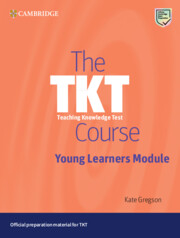Book contents
- Frontmatter
- Acknowledgements
- Contents
- Introduction
- Part 1 Knowledge of young learners and principles of teaching English to young learners
- Part 2 Planning and preparing young learner lessons
- Part 3 Teaching young learners
- Part 4 Assessing young learner learning in the classroom
- Follow-up activities: Answer keys and commentaries
- List of terms found in the TKT Glossary
- Glossary of TKT: Young Learners terms
- Test tips for TKT: Young Learners
- Teaching knowledge test young learners: Practice test
- Sample test answer sheet for TKT: YL practice test
- Answer key for TKT: YL practice test
- Frontmatter
- Acknowledgements
- Contents
- Introduction
- Part 1 Knowledge of young learners and principles of teaching English to young learners
- Part 2 Planning and preparing young learner lessons
- Part 3 Teaching young learners
- Part 4 Assessing young learner learning in the classroom
- Follow-up activities: Answer keys and commentaries
- List of terms found in the TKT Glossary
- Glossary of TKT: Young Learners terms
- Test tips for TKT: Young Learners
- Teaching knowledge test young learners: Practice test
- Sample test answer sheet for TKT: YL practice test
- Answer key for TKT: YL practice test
Summary
What are TKT and the TKT: YL specialist module?
The Teaching Knowledge Test (TKT) is a series of modular teaching qualifications which test knowledge in specific areas of English language teaching. It is internationally recognised and has been developed by Cambridge English. In addition to the main modules (Modules 1–3), there are the specialist modules, namely: TKT: Young Learners and TKT: CLIL (Content and Language Integrated Learning). Candidates can take as many TKT modules as they want, in any order and over any time period.
The TKT: Young Learner Module (TKT: YL) focuses on language learners aged 6–12; the term young learner is used in this book to refer to this age group. Six years old is usually the age when children start formal schooling in many countries, while twelve years old is around the end of primary, elementary or basic schooling. Developmentally, children in this age group are beyond the stage of early childhood, but are not yet adolescent. As such, they have particular developmental needs which are somewhat different from very young children or teenagers.
TKT: YL tests candidates’ knowledge of concepts related to young learner learning and development, as well as knowledge of young learners from a teaching perspective: the planning, teaching and assessment of young learners’ work. There are no entry requirements, such as previous language teaching experience or qualifications, however candidates’ language skills should be at least at a B1 level on the CEFR scale. This is equivalent to Cambridge B1 Preliminary or Cambridge IELTS Bands 4–5, which is an intermediate level of English. Candidates are also expected to be familiar with key language teaching terminology, which can be found in the TKT Glossary on the Cambridge English website.
The TKT: YL test is a paper-based test lasting 1 hour and 20 minutes. It consists of objective tasks, for example matching or multiple choice, with 80 closed questions in total. Candidates respond by selecting answers and marking them on the answer sheet. There are no open response questions where candidates write their answers in words, phrases or sentences. Each question carries one mark, and performance is reported using four bands, which indicate the depth of the candidates’ knowledge.
- Type
- Chapter
- Information
- The TKT Course Young Learners Module , pp. 1 - 5Publisher: Cambridge University PressPrint publication year: 2024

